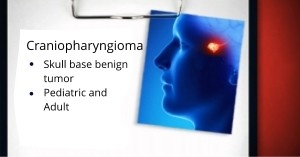Craniopharyngioma Newport Beach & Orange County, CA
Craniopharyngioma Treatment in Orange County
 Craniopharyngioma is a skull base benign or non-cancerous tumor that develops in the pituitary gland. There are two types of this tumor: pediatric and adult craniopharyngioma. This slow-growing tumor is commonly found in two age groups— children up to age 14 and adults over age 45.
Craniopharyngioma is a skull base benign or non-cancerous tumor that develops in the pituitary gland. There are two types of this tumor: pediatric and adult craniopharyngioma. This slow-growing tumor is commonly found in two age groups— children up to age 14 and adults over age 45.
- Headaches
- Nausea
- Vomiting
- Visual symptoms
- Balance problem
- Hormonal imbalances
- Delayed puberty
- Stunted growth
- Decreased libido
- Weight gain
- Cold intolerance
- Fatigue or lethargy
- Diabetes insipidus (excessive thirst and urination)
- Absence of menstrual period in females
- Diabetes insipidus
- Behavioral change
- Hormone tests- Blood tests can help detect the overproduction of prolactin as a result of a pituitary tumor.
- Magnetic resonance imaging (MRI)or computerized tomography (CT) scan- For more detailed pictures of the brain.
- Computerized tomography (CT scan)
- Vision test- This test will help determine if the growth of a pituitary tumor has affected or impaired your sight or peripheral vision.
- Endocrinologist- Depending on your other symptoms, you may be referred to an endocrinologist for further diagnosis.
Minimally Invasive Endoscopic Transsphenoidal Surgery
Orange County neurosurgeon Robert Louis, MD, specializes in minimally invasive endoscopic transsphenoidal surgery in the removal of craniopharyngioma. This sophisticated procedure removes the tumor while minimizing complications, hospital time, trauma, and discomfort. Dr, Louis has the specialized skills and training with this advanced technique. Read more about Endoscopic Transsphenoidal Surgery.
Radiation Therapy
Radiation therapy for craniopharyngioma is recommended for some patients when surgery and medication are not sufficient to control the tumor and prevent the tumor from growing. Periodic MRI should be obtained twice a year for up to five years after the surgery or radiation and annually thereafter because craniopharyngioma tends to recur. Radiation therapy involves a highly focused dose of radiation to the tumor.
Hormone Replacement Therapy
Most patients with craniopharyngioma will develop pituitary hormonal deficiencies because of the tumor or side effects of radiotherapy. Patients may undergo hormone replacement therapy, which may include thyroid, cortisol, testosterone for men, and estrogen for women. Patients should have regular hormonal evaluations and visits to endocrinologists.
Robert Louis, MD, a fellowship-trained Orange County Neurosurgeon, is the Director of the Skull Base and Pituitary Tumor Program at Hoag Memorial Hospital in Orange County, California. Dr. Louis has particular expertise in the endoscopic and minimally invasive treatment of benign and malignant brain tumors, sellar and parasellar tumors, and skull base tumors.
Dr. Robert Louis specializes in minimally invasive endoscopic transsphenoidal surgery for the removal of craniopharyngioma. For appointments, please call (949) 383-4185 or Contact Us.



